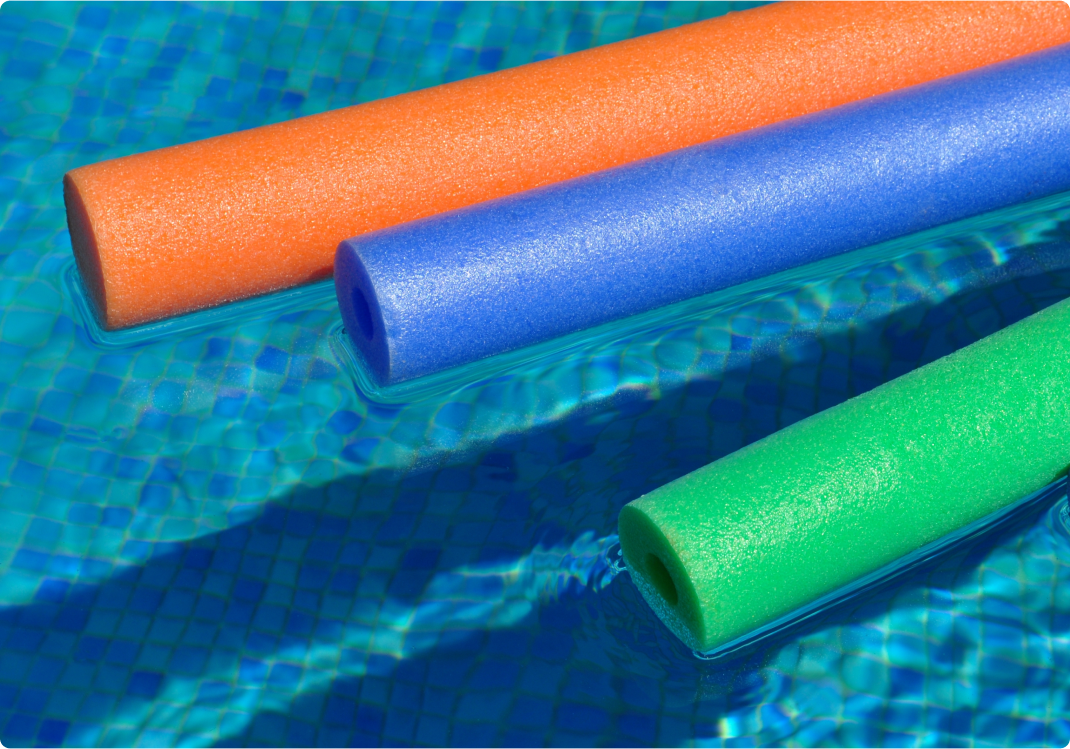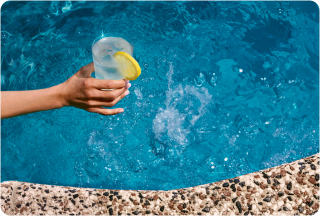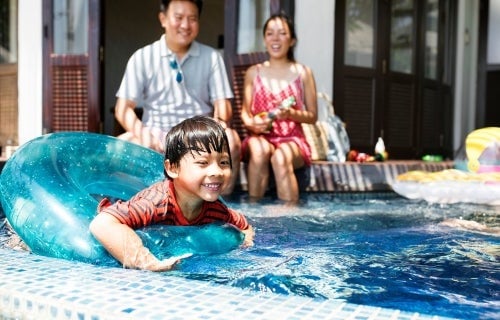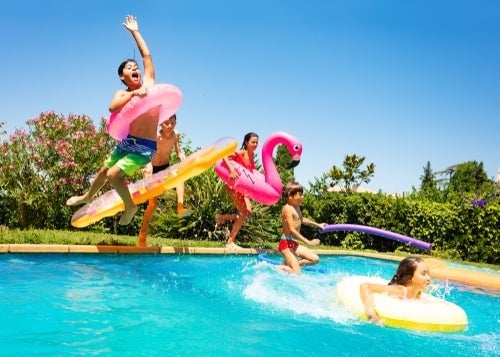Polyethylene Foam
Polyethylene foam is a widely used material in pool noodles and floats due to its lightweight, durable, and cushioning properties. It’s generally considered safe and non-toxic, but there are some concerns when it’s exposed to extreme heat or certain chemicals. Under these conditions, polyethylene foam can release small amounts of harmful substances. Potential exposure to these toxins is usually minimal but can occur through inhaling fumes if the foam is burned or through ingesting small particles that break off over time, especially in older or heavily used products. While skin contact is generally not a significant concern, it’s still wise to handle these products with care.
Polystyrene
Polystyrene is a plastic commonly found in disposable coffee cups, food containers, insulation, and some pool floats. It's lightweight and easy to mold, making it a popular choice for various products. However, the main concern with polystyrene is its potential to release styrene, a chemical that can be harmful to health. Styrene exposure has been associated with respiratory problems, skin irritation, and even an increased risk of cancer, though more research is ongoing. You can be exposed to styrene by inhaling fumes, especially when polystyrene products are heated or burned, or by ingesting food or drinks that have been in contact with polystyrene, particularly hot liquids or fatty foods.
Lead
Lead is a toxic heavy metal that was once commonly used in products like paints, pipes, and even toys. Although its use has been significantly reduced due to health concerns, lead can still be found in some older or imported pool toys and floats. Lead exposure is particularly dangerous for children, as it can lead to developmental delays, cognitive impairment, and other serious neurological issues. In the context of pool toys, children are at risk if they chew on or handle items containing lead.
High-risk pool toys: What to avoid
When it comes to pool toys, some materials pose a higher risk than others. Traditional pool toys like vinyl floats, water wings, and kickboards are often the culprits, as they may contain harmful chemicals like PVC, phthalates, polystyrene, or even lead in older or imported items. A good rule of thumb is: if something is inflatable or made from rigid plastic, it could contain materials that pose health risks.
Heat can exacerbate these risks by encouraging harmful chemicals, such as phthalates or styrene, to leach out of the plastic. So, leaving these toys to bake in the summer sun might increase your exposure to these toxins.
Tip: Wondering how to tell for sure if one of your pool toys contains PVC or other harmful materials? Check the recycling triangle symbol. If you see the number 3, “V,” or PVC inside the mark, you’re dealing with PVC. For polystyrene, look for the number 6 or the letters “PS.” Avoiding these toys, or replacing them with safer alternatives, can help reduce your exposure.
Non-toxic pool noodles: How to find safer toy alternatives
PVC and phthalates don’t have to put a damper on your summer fun. Fortunately, there are some safer alternatives on the market. If you want to avoid potential exposure to toxic chemicals, look for items made with ethylene vinyl acetate, or EVA.
Products made with EVA are flexible and include most pool noodles. Yes, your pool noodles are probably safe! Other products made with EVA include foam float belts and mats.
Styrofoam-like products made of EVA are probably not harmful if ingested (for dogs or humans!), but you should keep an eye out for choking in young children.
Of course, if you can’t find products made with EVA, you can buy used toys made with PVC. Because these have already been off-gassed, they have a lower risk of exposure.
Don’t worry, be warranty.
As you consider the safety of your pool noodles and floats, it's clear that making informed choices can help protect your family’s health. But while you’re thinking about pool safety, it’s also a great time to think about the broader picture of home maintenance, including your pool.
With an American Home Shield® home warranty, you’ll have peace of mind knowing that unexpected breakdowns of your major systems and appliances are covered. And when you add on a built-in pool and spa equipment warranty, you can specifically safeguard against costly pool repairs and maintenance issues so that your backyard oasis stays in top shape all season long. From the material of your pool toys to a hiccup in your pool’s filtration system, American Home Shield has you covered.




